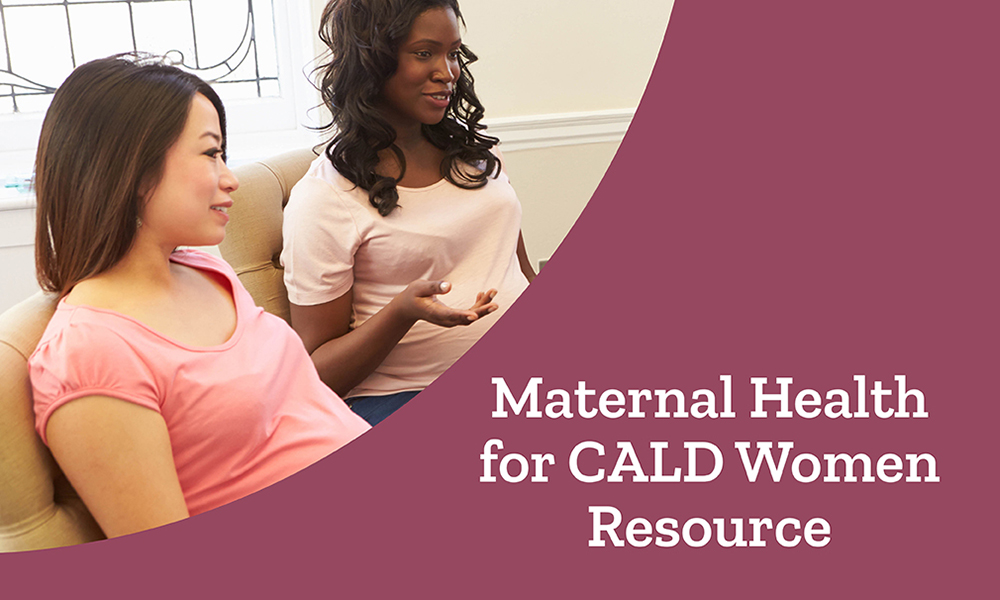Maternal Health for CALD Women
Online ResourcePrerequisites
It is expected that viewers will:
- Have completed Module 1 - Culture and Cultural Competency.
Additionally, it is highly recommended that the readers of this resource will:
- Have completed Module 2 - Working with Migrants (Asian) Patients course.
- Have completed Module 3 - Working with Refugee Patients course.
- Have completed Module 4 - Working with Interpreters course.
Additional valuable information on working in a culturally competent way with migrants, refugees and interpreters can be found in the following courses and supplementary resources:
- Module 7 - Working with religious diversity.
- CALD supplementary resources:
- Working with Asian Mental Health Clients.
- Working with Middle Eastern and African Mental Health Clients.
- CALD Family Violence Resource for Health Practitioners: Working with Asian, Middle Eastern and African Clients.
To access the above courses you need to check your eligibility and how to register/enrol.
About this resource
This HTML resource is a guidance document for health providers working with Asian, Middle Eastern and African women.
It contains research materials, useful cultural assessment tools and tips and case scenarios to enable learners to gain knowledge and skills.
The aim is to:
-
Promote culturally appropriate services and support for CALD women transitioning from pregnancy and birth to parenthood.
-
Promote best practice in maternity care for CALD women.
-
Improve care for CALD women and their babies in birthing units and community settings through health provider’s understanding of:
-
The cultural beliefs, health practices and perspectives of CALD women towards pregnancy, birth, postnatal care, parenting education and nutrition.
-
Culturally appropriate approaches to addressing emotional distress and perinatal depression in migrant and refugee-background mothers.
-
-
Improve perinatal mental health care and support for CALD women through health providers understanding of the:
-
Transition period to new parenthood and the social, cultural and religious factors which shape emotional responses to parenthood for CALD women and their families.
-
Culturally appropriate approaches to addressing emotional distress and perinatal depression in migrant and refugee-background mothers.
-
Cultural factors’ that impact on postpartum depressive symptomatology.
-
-
Provide culturally appropriate assessment and screening tools for health providers to improve maternal health outcomes for CALD women and their families.
Who should view this resource
Health providers who contribute to the care of women during pregnancy, birth and the postnatal period including: Lead Maternity Carers (LMC), hospital midwives, general practitioners (GPs), obstetricians, neonatologists, paediatricians, Well Child/Tamariki Ora (WCTO) nurses, public health nurses, practice nurses, allied health professionals, psychiatrists, mental health nurses and other mental health practitioners. The way in which different health providers or health practitioners use these resources will vary depending on their knowledge, skills and role, as well as the setting in which care is provided.
Author/owner
Te Whatu Ora - Waitematā
Published on 31st August 2016, by Waitemata District Health Board, eCALD® Services.
Authors: Dr Annette Mortensen and Sue Lim
ISBN 978-0-473-36779-4 (Paperback)
ISBN 978-0-473-36780-0 (PDF)
ISBN 978-0-473-36781-7 (HTML)
Suggested citation: Waitemata DHB, eCALD® Services (2016). Maternal Health for CALD Women. Working with Asian, Middle Eastern and African Women. Auckland: WDHB, eCALD® Services. Retrieved from: http://www.ecald.com/Resources/Cross-Cultural-Resources/Toolkits-Manager/type/View/ID/2266
© Waitemata District Health Board
